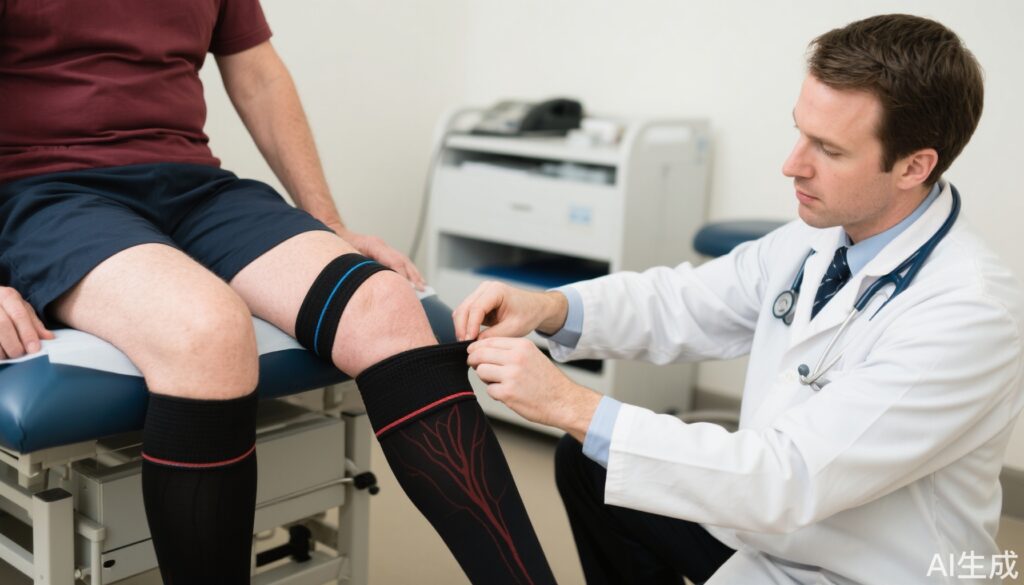Study Background and Disease Burden
Vasovagal syncope (VVS) is a prevalent and challenging clinical condition characterized by transient loss of consciousness due to a reflex-mediated drop in heart rate and blood pressure. It significantly affects quality of life, resulting in injury risk and frequent healthcare utilization. Despite its high prevalence, effective treatment options remain limited. Elastic compression stockings (ECS), which exert graduated pressure on the lower limbs to reduce venous pooling, have been proposed as a nonpharmacological intervention to prevent VVS recurrence by improving venous return and attenuating hypotensive episodes. However, robust evidence for their efficacy in real-world clinical practice remains lacking.
Study Design
This multicenter, parallel, double-blinded, randomized sham-controlled trial aimed to evaluate the effectiveness of thigh-high ECS in preventing recurrence of VVS. Adults aged 18 to 65 years with at least two documented VVS episodes in the preceding year were enrolled. Participants were randomized in equal proportions to receive either active thigh-length open-toe ECS applying 25-30 mm Hg pressure or visually identical sham stockings exerting minimal pressure (≤10 mm Hg). All participants received standard care, comprising education on syncope and lifestyle modifications, with no additional pharmacologic prevention allowed. Adherence to ECS use was monitored through participant diary booklets. The coprimary endpoints were: (1) the proportion of participants experiencing one or more VVS recurrences within 12 months, and (2) time to first recurrence (i.e., syncope-free survival).
Key Findings
A total of 266 participants (mean age 39 years, 58% female) completed 12 months of follow-up. VVS recurrence occurred in 29.1% of the ECS group (39 of 134 participants) versus 34.8% of the sham group (46 of 132 participants), translating to an absolute risk reduction of 5.7%; however, this difference did not reach statistical significance (p = 0.315). Survival analysis showed no significant difference in syncope-free survival between groups (hazard ratio [HR] 0.81, 95% confidence interval [CI] 0.53–1.24; p = 0.333).
Adherence to ECS was suboptimal, with approximately one-third of participants discontinuing use (37.3% in the active group vs 34.8% in the sham). There were no significant differences between groups in discontinuation rates, duration of ECS use, or adherence levels. The median number of recurrent VVS episodes was comparable between groups (2.5 episodes in the treatment arm vs 2 episodes in sham; p = 0.839).
Interestingly, a secondary analysis revealed that VVS episodes that occurred while participants were actively wearing ECS were significantly fewer compared to episodes occurring when ECS were not worn (32.7% vs 45.1%; p = 0.024). This suggests a possible symptomatic benefit during active compression use.
No significant adverse events related to ECS were reported. The blinding was maintained effectively due to the identical appearance of active and sham stockings.
Expert Commentary
This study represents the largest randomized sham-controlled evaluation of thigh-high ECS for VVS prevention to date. The findings indicate that while thigh-length compression stockings do not reduce the overall recurrence rate or prolong syncope-free survival, they may provide transient protection against syncope when worn. This nuance is clinically important, as patients may benefit from ECS use during high-risk situations.
Limitations include modest adherence rates and the possibility that thigh-high compression may not sufficiently address venous pooling in the pelvic and abdominal regions, which also contribute to VVS pathophysiology. Future studies could explore the impact of compression garments applying more extensive coverage targeting pelvic veins.
Current syncope management guidelines emphasize education and lifestyle modification as first-line therapies, with limited pharmacological or device options mainly reserved for selected patients. Compression therapy remains an attractive, low-risk intervention that may be recommended selectively, especially in patients with demonstrated benefit during use or those who experience predictable syncope triggers.
Conclusion
The randomized trial by Tavolinejad et al. demonstrates that thigh-high elastic compression stockings do not significantly reduce the cumulative incidence or timing of VVS recurrence over 12 months compared to sham stockings. Although these stockings do not decrease the frequency of multiple syncope episodes overall, a symptomatic reduction of events during active ECS use was observed. Routine prescription of thigh-length ECS for syncope prevention is not supported by current evidence, but they may serve as adjunctive therapy for certain patients when combined with standard care. Further research should explore compression modalities targeting broader venous territories to better mitigate vasovagal syncope recurrence.
References
Tavolinejad H, Bozorgi A, Emkanjoo Z, Oraii A, Shahabi J, Mollazadeh R, Kiarsi M, Yadangi S, Babaei M, Oraii S, Hosseini K, Sadeghian S, Zadkamali M, Mohsenzadeh A, Alaeddini F, Raj SR, Fedorowski A, Tajdini M. Using Compression Stockings to Prevent Recurrence of Vasovagal Syncope: A Randomized Sham-Controlled Trial. J Am Coll Cardiol. 2025 Aug 12;86(6):412-422. doi: 10.1016/j.jacc.2025.05.049. PMID: 40769669.



